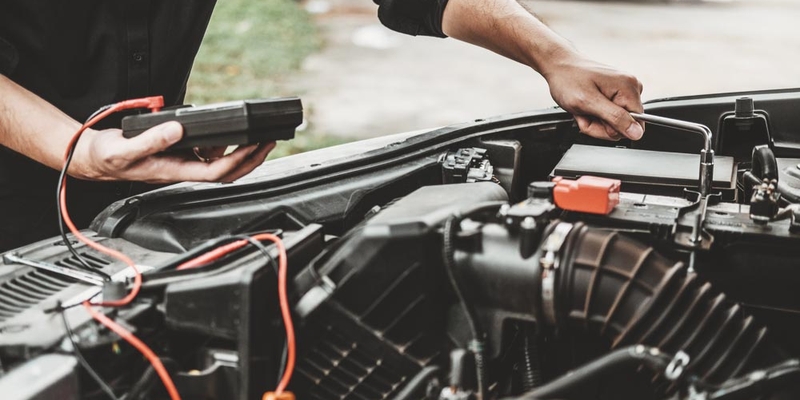
If you are not redirected within 30 seconds, please click here to continue.
Samedi: 10h – 16h HAE

If you are not redirected within 30 seconds, please click here to continue.
If you are not redirected within 30 seconds, please click here to continue.
It happens all the time. Someone gets into a not-at-fault collision, clears their claim with their insurance company and are handed a list of repair shops to bring their car back to road-ready condition.
The repair shops on that list — known as their “preferred vendors” — have been hand-picked and vetted by the insurance company. Not only are they known to get the job done, they’ll also protect you and the insurer from falling victim to fraud.
But out of all the many independent places out there, why are these repair shops recommended? And do you have to use them?
Let’s dig in.
What is a preferred vendor?
A preferred vendor is a pre-approved auto repair shop, which range from smaller local body shops to nationwide chains. They all share one thing in common: accreditation and accountability.
“Insurance companies go through a process of vetting and then they assign the accreditation to those body shops,” says David Mayer, director of insurance at Rates.ca. “For example, Assured Collision is a big one. They’re reputable, but the insurance companies also have an audit process with them during a claim situation that makes sure everything’s done within the right amount of time. They have check lists that need to go through the insurance company.”
When a customer gets their work done at a preferred vendor, the work is guaranteed.
That means that the insurance provider approves the estimate, ensures that the work is documented that the parts are within the precise specifications of the car model and manufacturer, and confirms that an appropriate warranty will be assigned.
The vendors also take care of the billing.
“When you go to preferred body shop, you only pay your deductible directly to the body shop,” says Mayer. “Everything's taken care of with the insurance company.”
The direct billing makes it easier for all parties involved, especially the driver, who might not have thousands of dollars on hand to pay an invoice and the flexibility to wait for a reimbursement.
Manufacturer approved body shops are also insurer preferred vendors
As cars become more sophisticated and digitized, there’s another reason to go to a preferred vendor: They use Original Equipment Manufacturer (OEM) parts and are specially trained to handle diagnostic issues with the internal car systems and software.
While relatively few independent body shops are properly trained and equipped to service electric vehicles, Teslas and other manufacturers restrict sales of their parts only to carmaker-approved service centres. That makes it a no-brainer for anyone driving a techier car.
“Typically, the manufacturer approved body shop will be approved by insurers, as well,” says Mayer.
Same with the Tag Tracking System. As auto thefts have swept Canada, insurance companies are bearing the brunt of the crisis. To mitigate the risk of more thefts, some insurance providers have urged their customers to get this highly specialized GPS tracker. The tracker comes in multiple units which are implanted to different parts of the car, requiring professional installation by an experienced hand.
As such, Tag also has their own list of authorized installers – a mix of dealerships and automotive electronics shops. Not only do these vendors work directly with insurance companies to facilitate rebates and discounts for customers, they also ensure that the Tag system is installed correctly and efficiently, increasing auto theft recovery rates.
Related: Thefts drive up insurance premiums by 25% on most stolen vehicles
Can you go to a non-preferred vendor?
Drivers aren’t legally obligated to get their work done at recommended repair shops. Certain circumstances may prevent them from heading to the nearest insurer-approved collision centre.
Some want to support a local shop or have a personal connection at an independent auto body shop. Other drivers may live in rural or remote locations, with few repair centres nearby. Owners of high-end or very unique cars may prefer to go directly to the dealership to get their repairs done.
The good news is that if you have a body shop that you really want to go to, it might be on the list of preferred vendors.
“If you have your own preferred body shop, check with your insurance company because it might actually be on their roster,” says Mayer.
However, he cautions, if it isn’t included, make sure you have a good reason why you want to go there.
“If it’s a family relationship, I would probably advise against it,” he adds.
As insurance companies are ultimately the ones footing the bill for the repair and the temporary loss of use of the vehicle, they have a vested interest in making sure that the repair is completed to standard within a reasonable amount of time.
They also draw a line at paying for certain damages.
If, for example, a driver decides to go to a local body shop that isn’t on the list of preferred vendors and the repair is done badly, the driver will be responsible for any future damages arising from that poor job.
“If there’s shoddy workmanship, like they didn’t paint something right or a part isn’t properly attached or sanded down and it needs to get fixed again, you’re going to be on your own,” says Mayer. “Your insurance company is most likely to say, ‘Sorry, because you didn’t go to this collision centre that we advised you to go to, if you want this repaired, you’ll have to pay out of pocket to get it repaired.”
What happens if fraud occurs?
Insurance companies are always on the lookout for fraud. In 2017, Aviva Canada conducted a lengthy investigation looking into unjustified invoicing practices by comparing their appraised damages to the invoices given to them by local autobody shops. In addition to the appraisals, they also installed hidden cameras in their cars to see what was going on at these shops.
In one shop, investigators were billed unjustified charges for parts amounting to nearly $3,000. Another shop invoiced them for nearly $10,000 more than the independent appraisal amount, including charges for replacement parts that turned out not to have been replaced, and repair work that had not been done.
A third, McLaren Collision Centre, deliberately damaged the car that had been taken in, and invoiced Aviva over $4,500 in padded charges. In 2023, McLaren Collision Centre was fined $75,000 and prohibited from conducting further business by the Financial Services Regulatory Association of Ontario (FSRA).
“Insurance companies will investigate this because they know what a repair on a 2020 Toyota Camry should cost,” says Mayer. “They know that this kind of impact costs this kind of money to repair on this kind of vehicle. It’s almost like clockwork. So, if they’re charging double that at Jimmy’z Body Shop, they’re going to catch on to it. But it does happen.”
If you’ve succumbed to Jimmy’z wily charms and discover halfway through the repair that it’s taking a suspiciously long time — or some shady news comes out about Jimmy — your insurance company may pay for the incomplete work that’s been done and send you to one of their preferred shops.
If they prove that fraud has occurred after you’ve collected your car and paid the inflated bill, they may go as far as to ban their customers from going back to Jimmy’z.
Neither of these scenarios seems great though, does it? The next time you make a claim and get the go-ahead from your insurer, either stick with the list your insurer gives you, or ask about your desired repair shop. You may save your insurer thousands of dollars — and yourself the burden of a shoddy repair.
Read next: Why your new car's headlights cost $6,500 more than your old car's headlights
Don't waste time calling around for auto insurance
Use Rates.ca to shop around, and compare multiple quotes at the same time.
Get money-saving tips in your inbox.
Stay on top of personal finance tips from our money experts!











